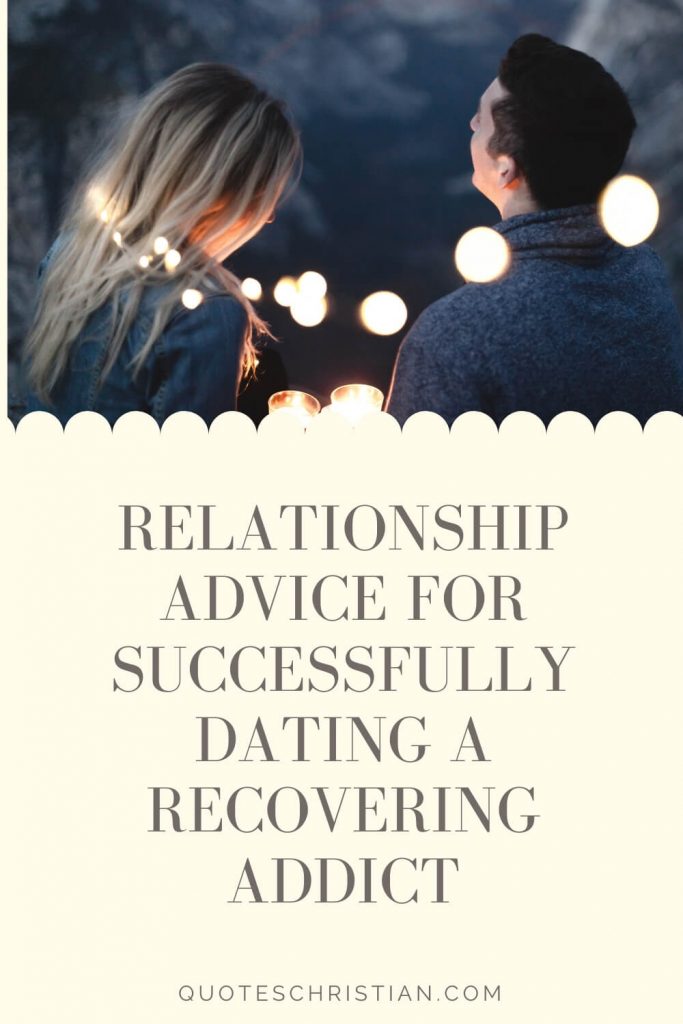On the dating scene, everyone has at least a loose concept of their “deal-breakers,” the issues or revelations that would send them running into the arms of the next contender.
Some entries on the list are shared by many (“I’m married”), while others are a matter of personal preference, such as dating someone who at one time was addicted to drugs or alcohol.

If you decide to date a recovering addict, there are a few considerations to keep in mind.
Do
Do get the facts about their recovery
By itself, being clean and sober doesn’t make a recovering addict relationship material. How long have they been sober? If the answer is less than one year, give them time to get grounded in their recovery before embarking on a romantic relationship.
Ideally, they’ll have much more than one year sober and be actively working a program of recovery (e.g., attending support group meetings or therapy, volunteering, etc.). This not only protects the recovering addict’s sobriety, but also your well-being and the health of the relationship.
Do educate yourself about the disease of addiction
To support your partner’s recovery, you need to know the basics of addiction. Contrary to widespread misconception, addiction is not a moral failing or a character flaw. Decades of scientific research have shown that addiction is a chronic, relapsing brain disease, similar in many ways to heart disease or diabetes, which requires lifelong care.
As such, recovering addicts need empathy and support. If you believe addiction is shameful or based on a lack of willpower, think twice about dating a recovering addict or learn more about the illness first.
Do support their recovery program
As you get educated about addiction, you’ll discover the critical importance of sober social support. As the partner of a recovering addict, there are a few changes you’ll need to make in your own life, such as avoiding drugs or alcohol or situations that trigger their desire to use like parties or bars, at least when they’re with you. Even if it’s inconvenient, the recovering addict may need to attend a self-help support group meeting or call their sponsor. Out of necessity, their recovery takes priority over all else.
Do know your limits
Addicts often have chaotic histories. You may hear stories of wild parties, unpaid debts, week-long drug binges or run-ins with the law. They may have tumultuous family relationships that make for awkward holiday celebrations and gatherings.
For some partners of recovering addicts, these war stories are welcome reminders of the misery of addiction; for others, it may be more baggage than they can tolerate. Before venturing into a relationship with a recovering addict, make an honest assessment of how much you can handle.
Don’t
Do not make snap judgments
If you hear the word “addict” and run the other way, that’s certainly your prerogative. There are legitimate concerns when dating a recovering addict, not the least of which is the threat of relapse.
But, by and large, recovering addicts are a relationship-worthy bunch, having overcome major obstacles and achieved a level of humility and self-awareness that sometimes surpasses those with no history of addiction.
Only you can decide who the right match for you is, but overlooking Mr. or Mrs. Right because they have an illness could be a mistake.
Do not rescue or enable
In recovery, as in active addiction, anything you do to protect your partner from the consequences of their actions can be considered enabling. You are not responsible for your partner’s recovery. They must take the steps to become healthy and fulfilled by attending meetings, volunteering and practicing healthier coping strategies.
As much as you may want to, you cannot control them, fix them or undo their suffering. What you can do is encourage them to work a program of recovery and offer support when needed.
Do not discount your own needs
Your support is essential to your partner’s recovery, but you do both parties a disservice if you fail to set and enforce personal boundaries. Clear limits help prevent you from enabling and also protect you from any addictive patterns still festering in your partner.
If you find yourself being treated in ways you never thought you’d accept, covering up for your partner’s behaviors or otherwise unhappy or unhealthy, you may benefit from individual and/or couple’s counseling and support groups for partners of addicts like Al-Anon. In some cases, it may not be the right person or the right time and you may need to move on.
Do not ignore the signs of relapse
Relapse remains a threat even decades into recovery and can be extremely painful for both partners. Given the chronic nature of the disease, it is wise to educate yourself about the signs of relapse and encourage your partner to get help if you detect a problem.
Although an estimated 40 to 60 percent of addicts relapse, a return to old habits is not inevitable. Even those who do relapse but get help immediately are often able to jump right back into their recovery.
Summary
Like any romantic relationship, dating a recovering addict can have its challenges. If you’re realistic about what you can handle and what kind of support you can offer, chances are the qualities you’re looking for in a partner can be found in a recovering addict just as easily as someone with no history of addiction.
Source: David Sack, M.D. via expertbeacon.com
Photo Credits: happy Couple by Flickr: AngelsWings; Check Man, Cross Man and Jump Man ©ioannis kounadeas – Fotolia.com
Recommended:- Advice For Men On Selecting Their Online Dating… Do you want to catch her attention? Your online photos are what will pique her interest, and convert an online looky-loo to an actual date in the real world. Sure,…
- Choose The Right Matchmaking Service To Help You Find Love Finding a soul mate today has become big business - $2 million-plus annually. How do you determine whether to use a professional matchmaker or an online dating service? Follow this…
- Warning Signs That The Man You Are Dating Is Not… We are usually so excited to meet someone new and begin dating that we can often and easily overlook qualities and traits that are barriers to the healthy, loving relationship…
- Most Guys Use Online Dating Sites To Find A Serious… With the presence of popular casual hook-up apps like Tinder and Grindr, you would think that guys log onto dating websites every day for one thing and one thing only—sex!…
- How To End The First Date Gracefully When You're Not… You’ve played out two hours, consumed three glasses of iced tea, and devoured a shared cheese plate; it’s time to hatch an escape plan from this first date. You’ve dropped…
- Being Happy When You Are Single Builds… Being a single person isn’t a bad thing, despite how many people might suggest that it is. In fact, it is a wonderful opportunity to explore who you are and…
- Best Practices On Surviving And Being Successful In… Online dating can be intimidating - especially for those of you who have been out of the dating game for a while. You may wonder if its safe, how comfortable…
- Heal From Past Relationships To Help You Move On And… Whether or not you believe in karma, fate, or destiny, we do have a great deal of control over many things that occur in our lives. Our outlook and the…
- Someone Who Can Date With Confidence Is Very Attractive Do you lack confidence in the dating world? Feeling uncertain and shy are not keys to success, nor are they attractive to your prospective partner. Having confidence when you are…
- Search For The Love Of Your Life With The Help Of A… There are “Date Doctors,” “match-makers,” and even therapists for dating-trouble. Dating Coaches are the new hot trend in this ever-changing dating landscape because they’re like personal trainers for your love…
- Be Cool, And Make It A Hot First Date With This… The first date sets the tone for a potential relationship. It can either ignite a fire or it can crash and burn. Follow these tips and you’ll hopefully never have…
- How To Grieve, Forgive, And Move On After A Failed… Have you just ended a long-term relationship with someone? Whether it was an exclusive dating relationship or a marriage, they can be ugly and painful--even for the one who initiated…
- How To Ask A Man Out On A First Date A lot has changed from when our mothers and grandmothers dated, yet sometimes we find ourselves following the same dating rules that applied to their day. One of these rules…
- How To Survive a Bad Date And Make The Next One Better The chemistry isn’t there, the conversation has stalled, and you’re counting down the seconds to when this bad date can finally be over. Here are 5 Dos and Don’ts to…
- Make Casual Sex And One Night Stands Fun,… Just because you’re having casual sex or one night stands doesn’t mean it needs to be as casual and monotonous as going to the bank. Just like dating, casual sex…
- Recreational Dating: Have Fun Finding What You Want… Not all dating has to be a search for “The One.” Recreational dating—dating just for fun—serves a very important role. You may not be ready for a committed relationship for…
- Be Smart And Professional At The Office If You Date… A recent study published by the UK’s DailyMail says couples who meet at work are more likely to actually marry. Great news if you have your eye on someone you’re…
- Have An Engaging Conversation When Going On A First… You’re at your favorite restaurant with your best friend, and you spot that adorable twosome on what is clearly a first date. You grin and stop your own conversation just…
- How To Date Your Best Friend And Not Kill Your Friendship It’s the stuff chick flicks are made of: you’ve been the best of friends for years and then—bam!—there’s this attraction, and you wonder if there could be something more. Well…
- Guidance For People Who Are Dating Someone With Kids Dating is challenging enough. You’ve found someone you’re attracted to and feel a connection with based on your interests and values. Whatever stage of the dating relationship you are in,…
- How To Make Long Distance Dating And Relationships Work You’re at a friend’s wedding and you finally meet someone who could be the one. They have all of the qualities you want in an ideal partner except Mr. or…
- How To Ask A Girl Out On A First Date Asking a girl out on a first date is very easy. The most important thing to do is to tailor your approach based on how well you know her. If…
- Know How Your Date Is Going By How She Is Flirting It can be difficult to read women at times, mostly because we're all trained to be so sweet and polite. But what if you had a little cheat sheet that…
- What To Do If You Find Out the Person You are Dating… The foundation of every relationship is trust. Without trust, there is no relationship. Lying about one’s marital status is one of the most severe breaches of trust. Here is some…
- Prevent Childhood Scars From Creating Bad Adult… Humans attempt to heal childhood trauma through repetition. When it comes to mate selection, we are drawn to partners who recreate our most disappointing and damaging childhood relationships. Rather than…
- Women: Use Sexy And Appealing Photos For Your Online… You want him to read your winning online profile, yes? Then catch his eye with your primary photo -- it’s your hook. Shoot for beautiful, natural, relaxed, and happy. A…



You must be logged in to post a comment.